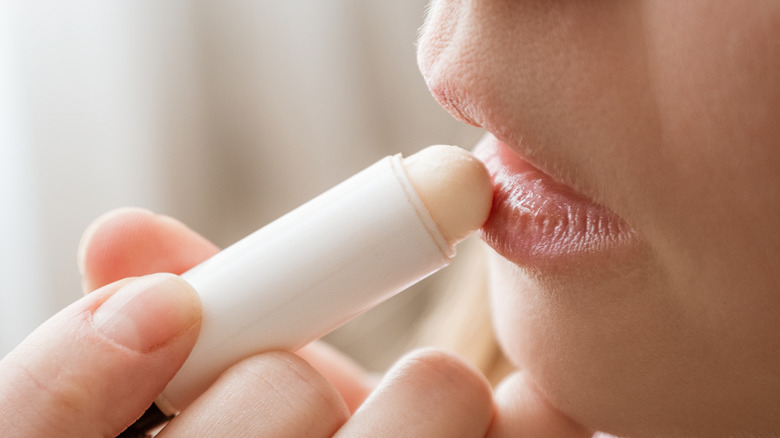Heal A Tongue Burn With This Easy Lip Balm Hack
A burnt tongue is often the result of impatience. You have a steaming hot bowl of spaghetti Bolognese in front of you at the restaurant that you dug into a little too soon or you took a sip of the hot coffee you were served at work and instantly regretted the decision. Now you've burned the roof of your mouth and your tongue.
Oftentimes, along with a stinging sensation that lasts for a few days, you'd experience some swelling, redness, and a decreased sense of taste in the area. According to Cleveland Clinic, you can blame the fine tissues in your mouth that allow you to taste and enjoy food for how quickly you get a superficial and sometimes even first-degree burn from sipping a hot beverage. Family medicine doctor Matthew Goldman, M.D. told the academic publication, "Some of the most common causes of oral burns include hot foods and nearly boiling liquids. Burns in the mouth can also occur from inhaling hot vapor."
You've probably already heard that one of the first things you should do when you burn your mouth is to drink cool water and perhaps also do a salt water rinse. Cold water will calm down any inflammation and also ease pain, while salt water is great for disinfecting the area and also soothing pain. Have you heard, however, that lip balm could also be a post-burn hack you can turn to?
The petroleum jelly in lip balm will moisturize the area
According to surgeon Sam Mandell, M.D., who practices at The UW Medicine Regional Burn Center at Harbor Medical Center (via Right as Rain by UW Medicine), lip balm can come to your rescue when you have a tongue burn. Just apply some on the scalded area and let the petroleum jelly work its magic — which is protecting and hydrating your skin. Mandell did caution, however, against lips balms that carry perfumes or pigments. Reach for the plain stuff just to be on the safe side. If you can find a lip balm with benzocaine, even better. That'll help soothe the pain.
"In most cases you won't have deeper damage to the tissue. Part of this is because when you drink something that's too hot, you realize right away and stop drinking, so it's a small amount and a short contact time," Mandell told the UW Medicine publication.
Even if the burn isn't serious, the now fragile area could potentially get worse if you injure it by trying to touch it or by brushing too hard, but this doesn't mean that oral hygiene should be neglected. In fact, it's one of the steps healthcare professionals recommend for speeding up the healing process. Keep up with your regular brushing and flossing, and add a saline rinse to the routine if possible. "But avoid alcohol-based mouth rinses, which can irritate wounds and increase pain," added Goldman. It might be best to put tongue scraping on hold too.
Understanding temperature could prevent tongue burns
Did you know that most of the hot beverages you purchase at a cafe or restaurant are probably too hot for you to drink right away? According to Mandell, "When it comes to burns from hot food and beverages, prevention is the best safety practice."
What you should be watching out for is temperatures — 110 degrees Fahrenheit and over could superficially scald you while something over 160 degrees Fahrenheit can be a lot worse, according to Mandell. For kids, the temperature is lower. "Anything over 120 degrees Fahrenheit can scald kids or give them a second-degree burn. Oftentimes a drink that might not bother you can burn them," added Mandell. It's also important to be aware that second-degree burns will manifest in blisters. Go see a doctor if this happens.
Goldman also cautioned against damaging your epiglottis — a flap of tissue that's under the tongue and at the back of your throat — which is something you should watch out for, particularly in younger children who experience tongue or mouth burns. "This is especially important in young children because their airways are narrower and more likely to be blocked from that swelling."
Post-burn hacks aside, maybe it won't hurt for you to exercise patience the next time a delicious but scalding hot dish sits in front of you. Your mouth will thank you for it.



